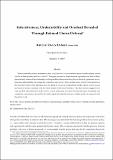Files in this item
Indecisiveness, undesirability and overload revealed through rational choice deferral
Item metadata
| dc.contributor.author | Gerasimou, Georgios | |
| dc.date.accessioned | 2019-03-24T00:37:59Z | |
| dc.date.available | 2019-03-24T00:37:59Z | |
| dc.date.issued | 2018-09 | |
| dc.identifier | 249442140 | |
| dc.identifier | 8f3c99b1-4cee-4397-9df5-185e0e770290 | |
| dc.identifier | 85029811443 | |
| dc.identifier | 000443948700010 | |
| dc.identifier.citation | Gerasimou , G 2018 , ' Indecisiveness, undesirability and overload revealed through rational choice deferral ' , The Economic Journal , vol. 128 , no. 614 , pp. 2450-2479 . https://doi.org/10.1111/ecoj.12500 | en |
| dc.identifier.issn | 0013-0133 | |
| dc.identifier.other | ORCID: /0000-0003-3712-3154/work/59698748 | |
| dc.identifier.uri | https://hdl.handle.net/10023/17356 | |
| dc.description.abstract | Three reasons why decision makers may defer choice are indecisiveness between various feasible options, unattractiveness of these options, and choice overload. This paper provides a choice-theoretic explanation for each of these phenomena by means of three deferral-permitting models of decision making that are driven by preference incompleteness, undesirability and complexity constraints, respectively. These models feature rational choice deferral in the sense that whenever the individual does not defer, he chooses a most preferred feasible option. Active choices are therefore always consistent with the Weak Axiom of Revealed Preference. The three models suggest novel ways in which observable data can be used to recover preferences as well as their indecisiveness, desirability and complexity components or thresholds. Several examples illustrate the relevance of these models for empirical and theoretical work. | |
| dc.format.extent | 364720 | |
| dc.language.iso | eng | |
| dc.relation.ispartof | The Economic Journal | en |
| dc.subject | Choice deferral | en |
| dc.subject | Incomplete preferences | en |
| dc.subject | Indecisiveness | en |
| dc.subject | Unattractiveness | en |
| dc.subject | Choice overload | en |
| dc.subject | Revealed preference | en |
| dc.subject | Rational choice | en |
| dc.subject | HB Economic Theory | en |
| dc.subject | T-NDAS | en |
| dc.subject | BDC | en |
| dc.subject | R2C | en |
| dc.subject.lcc | HB | en |
| dc.title | Indecisiveness, undesirability and overload revealed through rational choice deferral | en |
| dc.type | Journal article | en |
| dc.contributor.institution | University of St Andrews. School of Economics and Finance | en |
| dc.identifier.doi | https://doi.org/10.1111/ecoj.12500 | |
| dc.description.status | Peer reviewed | en |
| dc.date.embargoedUntil | 2019-03-24 |
This item appears in the following Collection(s)
Items in the St Andrews Research Repository are protected by copyright, with all rights reserved, unless otherwise indicated.

